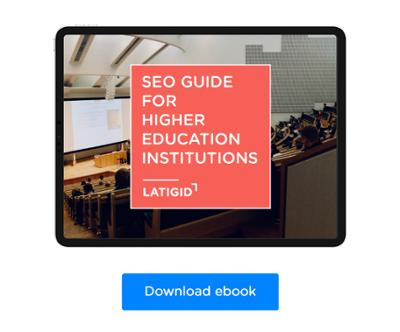
In today's digital age, search engine optimization (SEO) plays a crucial role in the success of higher education institutions. With prospective students and stakeholders relying heavily on search engines to discover and research educational institutions, having a solid SEO strategy is essential. In this article, we will explore the world of SEO for higher education and delve into the metrics and tools that can help institutions track their SEO performance effectively.
Related article: SEO for Schools: Increase Your Institution's Website Traffic
Importance of SEO for higher education institutions
A well-executed SEO strategy ensures that these institutions can be easily found by prospective students during their search process. By optimizing their website content, improving keyword rankings, and building authoritative backlinks, higher education institutions can enhance their online reputation and attract a larger pool of qualified applicants. Moreover, effective SEO practices help institutions stay ahead of their competitors and establish themselves as leaders in their respective fields. In a highly competitive educational landscape, investing in SEO is not just beneficial but necessary for higher education institutions to thrive and fulfill their goals of attracting, engaging, and retaining students.
Related article: How University's investment in SEO will boost enrollment?
Key SEO Metrics for Higher Education
When it comes to measuring the success of SEO efforts in higher education, certain key metrics serve as important indicators of performance. Here are some essential metrics for tracking SEO performance:
Organic Traffic
Organic traffic refers to the number of visitors that come to a website through non-paid search engine results. It is a crucial metric for higher education institutions as it indicates the visibility and reach of their website among their target audience. By integrating Google Analytics with their website, institutions can gain valuable insights into various aspects of their organic traffic, including the number of organic visitors, their behavior on the website, and the sources they come from.
Keyword Rankings
Keyword rankings refer to the position of a website in search engine results for specific keywords. To monitor keyword rankings effectively, higher education institutions can utilize tools like Semrush. SEMrush is a comprehensive SEO tool that provides valuable insights into keyword performance and allows institutions to track their positions in search engine results pages (SERPs). By entering the desired keywords into SEMrush, institutions can obtain information about their current rankings, any changes over time, and even compare their rankings with competitors.
Backlinks
A backlink is a link from an external website that points to a university or college's website. Search engines consider backlinks as votes of confidence or endorsements for a website's content and authority. Therefore, having a robust backlink profile is essential for higher education institutions to improve their search engine rankings and increase their visibility. To measure and analyze backlinks, institutions can utilize tools like Semrush. These tools offer comprehensive insights into the quantity and quality of backlinks. They provide information about the domains linking to a website, the anchor text used in the backlinks, and the overall authority of the linking domains.
On-Page Metrics
On-page optimization refers to the process of optimizing individual web pages to improve their search engine rankings and enhance user experience. It involves various factors, including content quality, keyword usage, meta tags, URL structure, internal linking, and mobile friendliness. One effective tool for monitoring on-page metrics is Google Search Console. By tracking on-page metrics through tools like Google Search Console, higher education institutions can continuously evaluate the performance of their on-page optimization efforts. They can identify areas that need improvement, discover content opportunities, and make data-driven decisions to enhance their search engine rankings and user experience.
Check this article made by Ahrefs: 10 SEO Metrics That Actually Matter
Tools for Tracking SEO Performance
Fortunately, several tools are available to help institutions monitor and analyze their SEO performance effectively. Here are some essential tools for tracking SEO performance:
Google Analytics
Google Analytics is a powerful and widely used web analytics tool that provides comprehensive insights into website traffic and user behavior. It offers valuable SEO metrics such as organic traffic, keyword performance, bounce rate, average time on page, and conversion tracking. Google Analytics enables institutions to track and measure the impact of their SEO strategies, identify trends, and optimize their website for better search engine visibility and user experience.
Google Search Console
Google Search Console is a free tool offered by Google that helps institutions monitor and maintain their website's presence in Google search results. It provides essential data and features for SEO, such as keyword performance, index coverage, crawl errors, and sitemap submission. Google Search Console allows institutions to monitor their search rankings, identify indexing issues, and optimize their website to align with Google's guidelines.
SEMRUSH
SEMrush is a comprehensive SEO tool that offers a wide range of features for tracking and improving SEO performance. It provides insights into organic traffic, keyword rankings, backlink analysis, competitor research, and site audits. SEMrush's robust features help institutions identify opportunities for optimization, monitor their competitors, and enhance their overall SEO strategy.
Check this article made by Semrush: How to Measure SEO Performance and Results
In conclusion, implementing effective SEO strategies and tracking performance is of utmost importance for higher education institutions. By understanding and utilizing key SEO metrics, institutions can gain valuable insights into their online visibility, keyword rankings, backlink profiles, and user engagement. With the help of powerful tools like Google Analytics, Google Search Console and SEMrush, institutions can monitor and analyze their SEO performance effectively. These tools provide essential data, metrics, and functionalities that enable institutions to make data-driven decisions, optimize their websites, and stay ahead in the competitive digital landscape.
LATIGID
We are a Higher Education Marketing Agency, specialized in SEO. We help you grow by increasing website traffic, generating more student leads and closing those leads into enrollment. With a deep understanding of the latest industry trends and best practices, we are well equipped to help your institution grow.
If you are looking for a Higher Education Marketing Agency to partner with, check our page to see what we can do for you!
Download our SEO guide and learn how to build a strategy to optimize your Higher Education Institution's website




